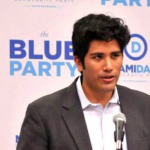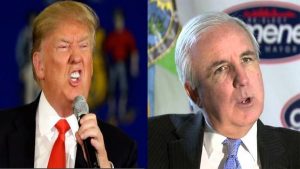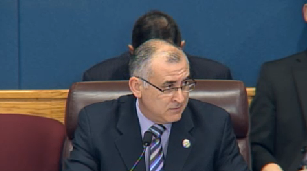(Continued from previous page)
said Rafael Velazquez, finance chair of the Miami-Dade Democratic Party, who specifically addressed Gimenez and, for some reason, Commissioner Bruno Barreiro. “This goes to the very core of what Miami is about.
“If our community is under attack, we stand up and fight back.”
Said Dade Dems Chairman Juan Cuba: “I’m deeply concerned about the way we criminalize people in our  community. Our communities are living in fear right now and they need to hear from this commission. They need to hear from you that you are standing up for them… young people are going to be separated from their families because of the illegal orders from Gimenez.”
community. Our communities are living in fear right now and they need to hear from this commission. They need to hear from you that you are standing up for them… young people are going to be separated from their families because of the illegal orders from Gimenez.”
He also told Bovo that what he was doing was unconstitutional. “I’m also very deeply concerned about how we are conducting the public session right now, that we are censoring certain words from being said. This is a broad topic… the people are speaking about the way we criminalize poeple in our society and I think that the way we are censoring people right now is unconstitutional and it is infringing on our public opportunity to be heard and speak to our public officials.”
Bovo — who told Ladra that there were political operatives taking advantage of the issue (more on that later) — thanked him for his time even though Cuba still had seconds left on his two minutes.
My time is not done,” he said.
“But I run the meeting, not you,” Bovo shot back.
And guess what? He’s going to keep running the meetings like this, he said.
Read related story: Levine Cava questions Gimenez on sanctuary about-face
Bovo told Ladra that he was going to make the same speech at every commission meeting — the one about any public comments being limited to items on the agenda. Ladra always thought that you spoke on agenda items as they came up and that the public comments section was to air your grievances, as it were, about, well, just about anything. Call it the pothole hour. Otherwise, when can the public address the commission about something they want to talk about? We have to get it on the agenda? Really? What if our district commissioner refuses?
This is as ludicrous as the rules that former Chairman Jean Monestime started applying that banned people who spoke on any item before a committee — which is usually less than half the full board — from speaking about it again at the commission level, when there are 13 votes. How is that fair? Wouldn’t someone want all the commissioners voting on an item to hear their objections or praise? What if my commissioner isn’t on the committee. Ah, you have to choose, Bovo said.
You would think that in a community like ours — where many of our parents, including the chairman’s, fled countries  precisely because they were ruled by dictators who quash dissent — elected leaders would err on the side of letting people speak as much and as often as they can, rather than limiting the when and where. They already own the how long. Developers and lobbyists get to go on and on and on about matters, but the public gets two minutes, three if someone is feeling generous. How is that fair?
precisely because they were ruled by dictators who quash dissent — elected leaders would err on the side of letting people speak as much and as often as they can, rather than limiting the when and where. They already own the how long. Developers and lobbyists get to go on and on and on about matters, but the public gets two minutes, three if someone is feeling generous. How is that fair?
Ladra understands Bovo’s intent. It may have turned into one of those longer meetings had the chairman allowed comments on the detention requests matter. But isn’t that what they are there for? Nobody promised them they would be getting out before the bad traffic. And while the meeting looked massive on paper, Bovo seems to be keeping the train on schedule and it ended by 3 p.m. And they talked for 30 minutes about bromeliads! So maybe this was actually the perfect opportunity to have this discussion — and the ratification or rejection of the mayor’s actions.
Because that is what is also at stake here — the fact that the mayor’s actions were done with disregard to a county commission resolution instructing the very opposite. Isn’t that something important? If I were a county commissioner, I would want to make sure that happened right away.
In fact, Ladra is surprised that none of the commissioners made sure it was an agenda item this week. We have to wait another 10 days now until the commission, maybe — though Ladra is not sure the votes are there — undoes the mayor’s action at the Feb. 17 special meeting. That would be 22 days after the mayor switched the policy for fear (yeah, right) of being labeled a sanctuary city and losing millions in federal funds (which experts everywhere have said is extremely unlikely and, at the very least, difficult). Dozens or hundreds of people could have been detained by then, hundreds of lives affected. Any commissioner who thinks this is important should not have waited.
What if one of the seven commissioners who signed on to the Friday meeting has some kind of “emergency” and can’t make it? Then there’s no quorum and it gets pushed back yet again. Could this have been the plan all along?
Because you have to apply the same rules to everyone or you are not just acting petty but also violating someone’s right to free speach. Bovo didn’t let people speak about the about-face on the detainer requests policy but he let a mother and a young man in a wheelchair who invited them to the walk for rare diseases, which was also not on the agenda. Bovo said he made that exception because they came on the wrong date and he didn’t want to send them home. And Ladra agrees. He shouldn’t have sent them home. But we’re also pretty certain that exceptions have been made in the past for visiting electeds from elsewhere.
Doesn’t that open the county up to a lawsuit from Cuba and the others who were kept from speaking or, worse, thrown out when they said the i-word? Isn’t that censoring the public comments for content?
Cuba, a longtime rally rouser who has also worked with labor organizations, said he talked to an attorney about what he says is a clear cut violation of his first amendment rights. Cuba admits that the activists were there to talk about the detention requests and had to adjust to “work within his ruling” about the agenda. But he insists they did.
“We were talking about the undocumented community in relation to these items. We were speaking to the resolutions. Some people strayed, but mostly we were speaking to the resolutions,” he told Ladra later. “There just happen to be a lot of undocumented juveniles in our community. It’s unbelieveable to me. He was censoring the content of what we were saying and you just can’t do that.”
Pages: 1 2

